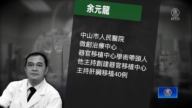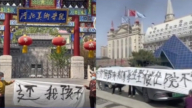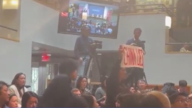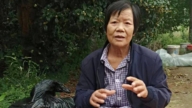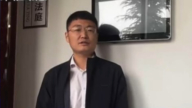【新唐人2014年09月24日讯】中国民间教育公益机构立人乡村图书馆理事会,日前发出公开信表示,由于受到中共有关当局长期以来的骚扰和打压,不得不主动停止图书馆运行。那么立人图书馆遭受了怎样的打压?当局到底为什么要打压一个民间公益组织?我们来看看。
9月18号,立人乡村图书馆召开董事会,宣布自当日起,立人乡村图书馆停止运营。同时还发出公开信,向多年来逼迫立人图书馆,关停分馆,非法扣留图书,威胁甚至遣返员工志愿者的有关当局,进行抗议和谴责。
公开信中说,从2011年起,立人图书馆开始遭遇巨大压力,导致多个分馆关闭或搬迁。2012年,图书馆所受压力全面升级,有关部门频繁给房东施压,在图书馆对面安装摄像头,甚至使用黑社会上门威胁,到去年,迫使8个分馆先后关闭。
今年6月开始,立人图书馆的信息平台和招募通道、以及筹款渠道也都先后遭到关闭。9月初,立人图书馆全部分馆,在同一时段,被多个部门连续上门“检查”,在没有“检查”出任何问题的情况下,各地合作方迫于压力,陆续要求解除与立人的合作关系。9月4号起,全国各地图书馆在10天内相继遭到关闭。
其中河南张国栋图书分馆,是立人图书馆发起人之一张大军自家的房子。这个馆被河南当地民政局发文“取缔”后,当地政府又将驻守该馆的志愿者遣返家乡,同时,将图书馆超过万册藏书非法搬走。至此,立人图书馆的20个分馆遭到关闭。9月18号,立人图书馆理事会,决定解散剩下的最后2间分馆。
《亚洲新闻周刊》总监黄金秋:“作为民间的图书馆,更多的是传播知识,传播真相,官方的图书馆过滤真相,篡改历史,按照它的意识形态去灌输斗争观念,灌输敌我矛盾的思维。图书馆的被关闭,更加证明它两个方面的虚弱,第一,对它自己洗脑失控的恐惧,第二,对民间活动的恐惧。”
原河北人民广播电台编辑朱欣欣:“这样做,只能使大家对中共这种专制的虚伪的本质,有更清醒的认识,不会对它寄予什么幻想。我们的权利就应当主动去争取,否则我们的权利会一步一步的被侵蚀,生存的空间会越来越狭窄。”
立人乡村图书馆成立于2007年,当时北京大学硕士毕业生李英强及其朋友,感慨于中国乡镇文化贫瘠的现实,决意投身乡村图书馆公益事业。7年来,先后在全国12个省市建立了22个分馆。在文化凋零、图书馆稀少的县乡地区,立人分馆在当地受到一些读者的欢迎。
朱欣欣:“图书馆作为一个公益事业,政府应当扶植,但是它不应当垄断,图书馆的内容不应当过度的干涉,垄断的文化只能成为专制权力的附属品,只能是用来愚弄人民,造成整个社会基本常识的缺乏,扼杀了人们思维的创新,中国好像有很多科学家知识份子,但是很少有原创性的创造,跟文化专制是绝对有关系的。”
公开信中说,乡村图书馆从成立之日起,为了避免被构陷,从来没有主动申请国外资助,也几乎没有得到过国外资金支持,一直坚持财务的完全透明。当局对立人的打压是违背国法天理良心的。
而据《法广》报导,一位关注立人的媒体人透露,此前曾有同事想去采访立人,半路上被省委宣传部打电话召回来,原因是这个图书馆被认定为“境外反动势力”,有“国家安全问题”。
立人图书馆创办人李英强,目前还是坚持不接受外媒采访。
立人图书馆创始人李英强:“没有什么罪名。很抱歉,因为我们对外媒一般不接受采访的,确实是谢谢你,(但是)像立人这种事情,没办法解决,我也没有什么期待。”
立人图书馆原本希望,在乡村能坚持三五十年,为乡村教育和文化带来真正的变化。但目前风暴来临,他们的这一愿望,看来已无法实现。
采访编辑/刘惠 后制/陈建铭
CCP Forces Closures of NGO Liren Libraries
The Liren Village Library Board—China’s non-government
organization (NGO)—recently issued an open letter that said,
the library would close down, due to long-term harassment
and pressure from the Chinese Communist Party (CCP).
What kind of suppression did Liren Library suffer?
And why does the CCP suppress a non-profit organization?
Sept. 18—The Liren Village Library held a board meeting,
announcing that it would stop operating from that day.
It also issued an open letter condemning and protesting
against the CCP after years of suppression, including their
shutting down of library branches, illegally detaining books,
and threatening and repatriating employees and volunteers.
The open letter stated that in 2011, Liren Library began
facing tremendous pressure, which caused multiple branches
to close or relocate, since 2012 the severity had worsened.
The authorities frequently put pressure on the landlord,
installed cameras across the library and even utilized
underhanded means to threaten them, so that by 2013,
eight branches had been forced to close.
In June this year, the library’s information platform
and its recruitment and fundraising channels were closed.
In September, all Liren library branches were investigated,
and even though the inspection returned no results,
local library partners were forced to cut off their partnerships.
Since Sept. 4, all branches of Liren Library across China
have been forced to shut down, within a matter of 10 days.
Henan’s Zhang Guodong branch was located at the house of
Zhang Dajun—one of the founders of Liren Library.
After it was banned by the local Civil Affairs Bureau,
the local government sent its volunteers home
and more than 10,000 books were illegally removed.
All 20 Liren Library branches have now been closed,
with the last two remaining being dissolved on Sept.18.
Asiaweek director, Huang Jinqiu: “As an NGO library,
they help spread knowledge and truth to people."
“Official libraries mainly filter the truth, distort history,
and instill the concept of contradiction and fighting,
according to the CCP’s ideology of struggle."
“The closures of the NGO libraries proves such weaknesses:
first—the CCP’s fear of losing control over its brainwashing,
and second—its fear of civil activities."
Zhu Xinxin, former editor, Hebei People’s Broadcasting:
“This only gives us a better understanding of the CCP’s
hypocritical nature so we won’t have any misconceptions;
we should take initiative to fight for our rights, otherwise
our rights will be taken away one by one
and our life privileges will become increasingly diminished."
Liren Village Library was founded in 2007 by Li Yuingqiang
—a Beijing University master’s graduate—and his friends.
They saw a lack of culture in Chinese communities
and dedicated themselves to setting up libraries in rural areas.
In seven years, they had set up 22 branches in 12 provinces;
they were welcomed in areas with poor cultural heritage.
Zhu Xinxin: “Libraries are important for public welfare
and the government should support this system;
it shouldn’t be a monopoly and library content shouldn’t be
interfered with—that’s cultural tyranny."
“The authorities only try to fool people, causing a lack of
basic knowledge throughout society and repressing people’s
innovation; so China has a lot of scientists and intellectuals,
but there’s little originality."
Liren Library says, since it opened, it had never applied for
foreign funding and rarely received foreign financial support
so as to avoid being framed; it was also totally transparent
financially—the CCP’s suppression is just immoral.
Radio France Internationale reported that, one media who’d
wanted to interview Liren Library had been stopped by
the provincial propaganda department, who called the library
a “foreign reactionary" and a “national security threat."
Liren Library founder Li Yingqiang still can’t accept
foreign media interviews and has refused to say
whether the authorities have any charges against the library.
Liying Jiang, Liren Library founder: “No charges;
sorry, we generally don’t accept foreign media interviews."
“I really want to thank you, but for these kind of things,
there’s no solution; I have no expectations."
Liren Library founders had hoped to bring real changes
to rural education and culture in the countryside
within 30-50 years; but that hope now seems unachievable.
Interview & Edit/LiuHui Post-Production/Chen Jianming




